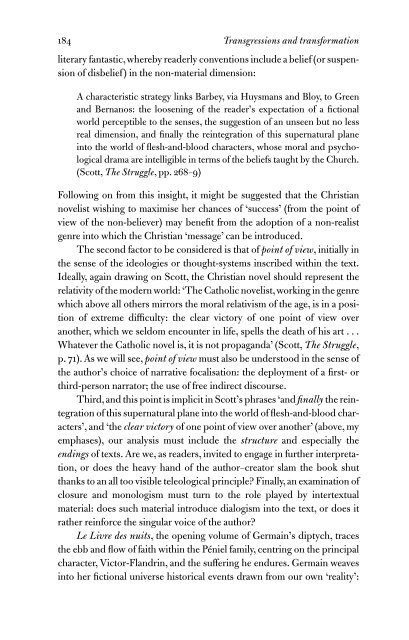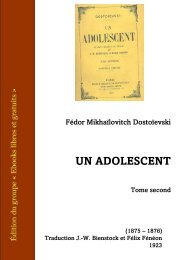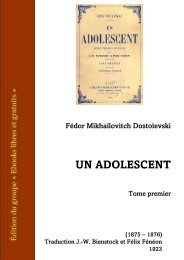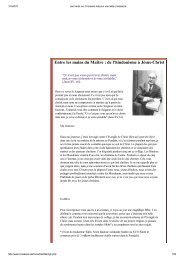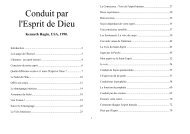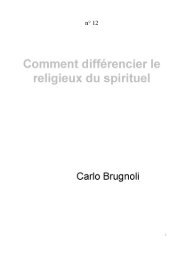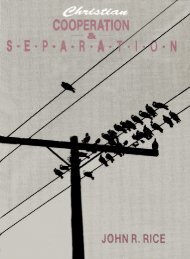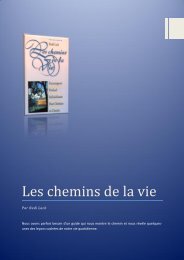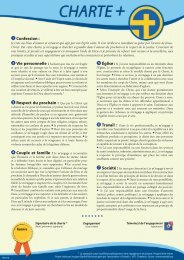Women writing in contemporary France
You also want an ePaper? Increase the reach of your titles
YUMPU automatically turns print PDFs into web optimized ePapers that Google loves.
184 Transgressions and transformation<br />
literary fantastic, whereby readerly conventions <strong>in</strong>clude a belief (or suspension<br />
of disbelief) <strong>in</strong> the non-material dimension:<br />
A characteristic strategy l<strong>in</strong>ks Barbey, via Huysmans and Bloy, to Green<br />
and Bernanos: the loosen<strong>in</strong>g of the reader’s expectation of a fictional<br />
world perceptible to the senses, the suggestion of an unseen but no less<br />
real dimension, and f<strong>in</strong>ally the re<strong>in</strong>tegration of this supernatural plane<br />
<strong>in</strong>to the world of flesh-and-blood characters, whose moral and psychological<br />
drama are <strong>in</strong>telligible <strong>in</strong> terms of the beliefs taught by the Church.<br />
(Scott, The Struggle, pp. 268–9)<br />
Follow<strong>in</strong>g on from this <strong>in</strong>sight, it might be suggested that the Christian<br />
novelist wish<strong>in</strong>g to maximise her chances of ‘success’ (from the po<strong>in</strong>t of<br />
view of the non-believer) may benefit from the adoption of a non-realist<br />
genre <strong>in</strong>to which the Christian ‘message’ can be <strong>in</strong>troduced.<br />
The second factor to be considered is that of po<strong>in</strong>t of view, <strong>in</strong>itially <strong>in</strong><br />
the sense of the ideologies or thought-systems <strong>in</strong>scribed with<strong>in</strong> the text.<br />
Ideally, aga<strong>in</strong> draw<strong>in</strong>g on Scott, the Christian novel should represent the<br />
relativity of the modern world: ‘The Catholic novelist, work<strong>in</strong>g <strong>in</strong> the genre<br />
which above all others mirrors the moral relativism of the age, is <strong>in</strong> a position<br />
of extreme difficulty: the clear victory of one po<strong>in</strong>t of view over<br />
another, which we seldom encounter <strong>in</strong> life, spells the death of his art . . .<br />
Whatever the Catholic novel is, it is not propaganda’ (Scott, The Struggle,<br />
p. 71). As we will see, po<strong>in</strong>t of view must also be understood <strong>in</strong> the sense of<br />
the author’s choice of narrative focalisation: the deployment of a first- or<br />
third-person narrator; the use of free <strong>in</strong>direct discourse.<br />
Third, and this po<strong>in</strong>t is implicit <strong>in</strong> Scott’s phrases ‘and f<strong>in</strong>ally the re<strong>in</strong>tegration<br />
of this supernatural plane <strong>in</strong>to the world of flesh-and-blood characters’,<br />
and ‘the clear victory of one po<strong>in</strong>t of view over another’ (above, my<br />
emphases), our analysis must <strong>in</strong>clude the structure and especially the<br />
end<strong>in</strong>gs of texts. Are we, as readers, <strong>in</strong>vited to engage <strong>in</strong> further <strong>in</strong>terpretation,<br />
or does the heavy hand of the author–creator slam the book shut<br />
thanks to an all too visible teleological pr<strong>in</strong>ciple? F<strong>in</strong>ally, an exam<strong>in</strong>ation of<br />
closure and monologism must turn to the role played by <strong>in</strong>tertextual<br />
material: does such material <strong>in</strong>troduce dialogism <strong>in</strong>to the text, or does it<br />
rather re<strong>in</strong>force the s<strong>in</strong>gular voice of the author?<br />
Le Livre des nuits, the open<strong>in</strong>g volume of Germa<strong>in</strong>’s diptych, traces<br />
the ebb and flow of faith with<strong>in</strong> the Péniel family, centr<strong>in</strong>g on the pr<strong>in</strong>cipal<br />
character, Victor-Flandr<strong>in</strong>, and the suffer<strong>in</strong>g he endures. Germa<strong>in</strong> weaves<br />
<strong>in</strong>to her fictional universe historical events drawn from our own ‘reality’:


